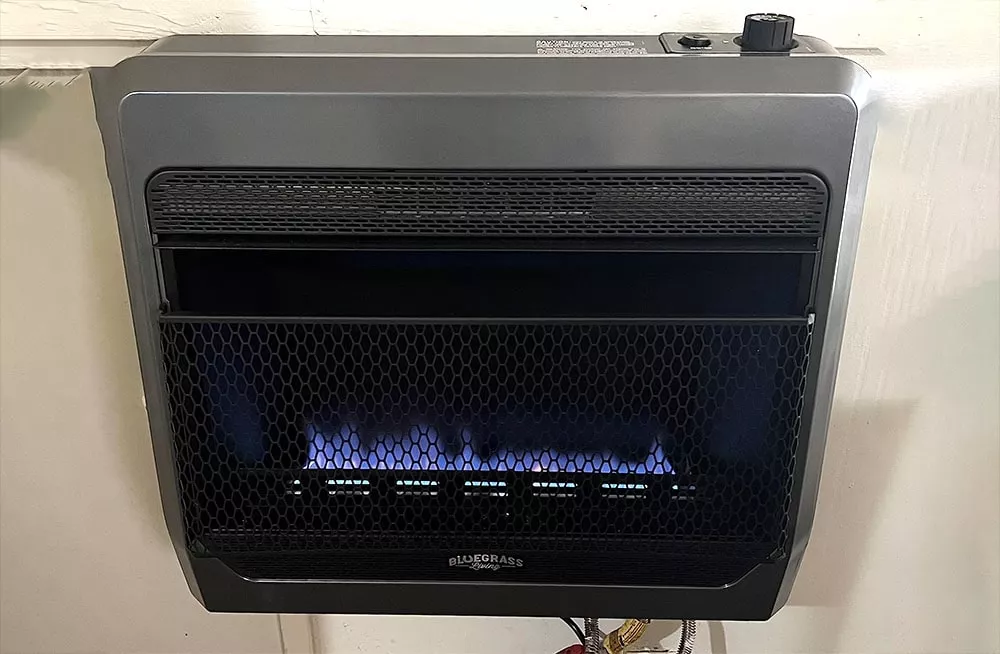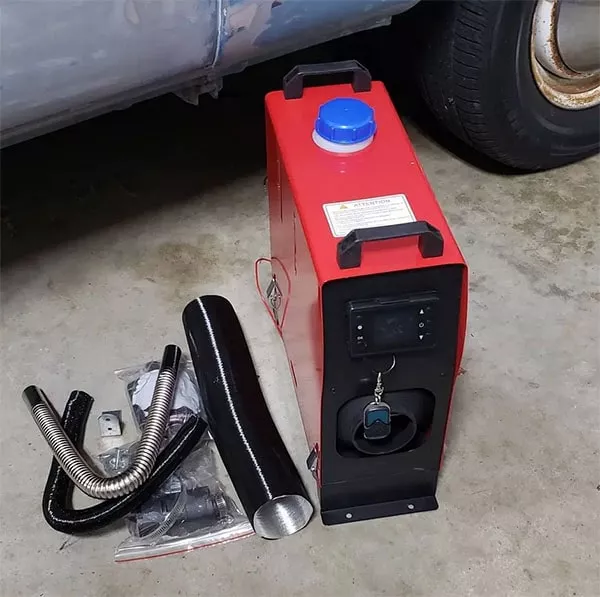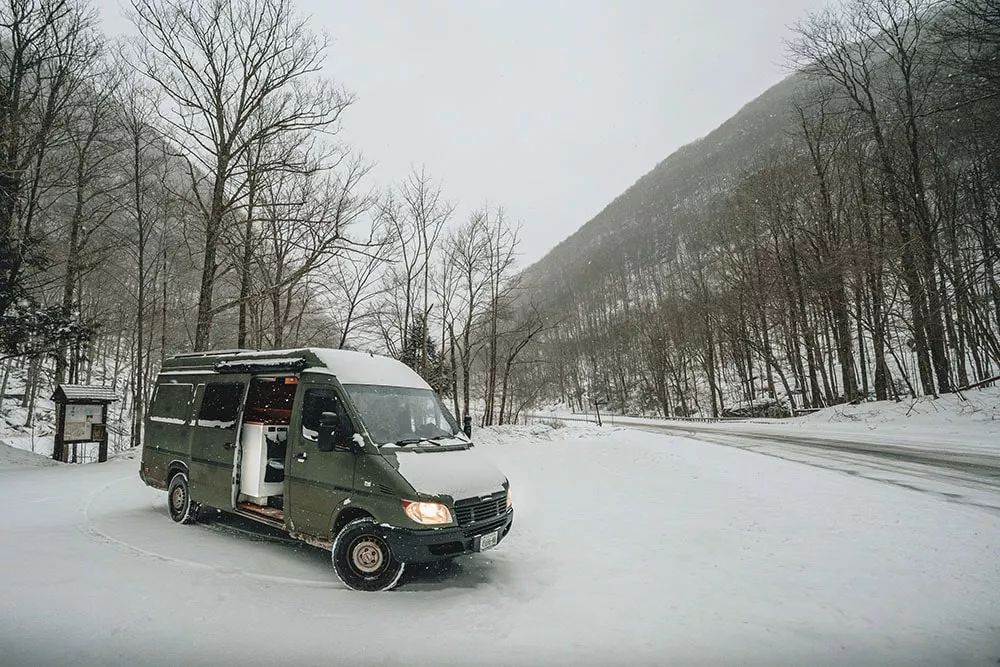Hi all. First off, I want to say, I am absolutely no van expert since I don’t possess one myself.
But I spent several nights in really cold environments, sleeping in an unheated car, sleeping outside on a freezing parking lot in mid-winter in the alps, and I even spent nights off-grid above 15,000 feet in the Himalayas.
So, even though I don’t drive a van around myself, I experienced quite a few nights in the freezing cold. And since I’ve been writing about heaters on this website for over 4 years now, it’s time to devote an article to the van community.
Realistically, I should write about spending nights in unheated cars in alpine environments. But who’s ever going to read that? So, with this article my goal is to help you pick the best winter heating strategy for your van, so you don’t end up like me.
How to Prepare your Van for Winter Heating
Before you start heating, you should prepare your van. Here’s how:
(Optional) Basic Van Insulation
Ideally, before you start heating, you should add insulation to your van. Insulation helps retain the heat in the cold winter.
Since vans are mostly metal, they are highly conductive to heat, which means they effectively carry all the inside heat outside.
Insulation can be as simple as mounting cloth to the sides of your van. Any non-metallic material added to the inside walls of your van adds insulation.
 Here’s me “insulating” my car for a freezing night. Basically, I wrapped everything in blankets. It worked out. We didn’t even need a heater.
Here’s me “insulating” my car for a freezing night. Basically, I wrapped everything in blankets. It worked out. We didn’t even need a heater.
But ideally, you should cover your van in fiberglass insulation. Fiberglass insulation is very similar to wool, but it’s fireproof. It traps air between the millions of fiber strands, which prevents heat from escaping your van.
Fiberglass insulation is very affordable if you don’t buy it on amazon. For whatever reason insulation (and other home-DIY-project materials) seem to be rather expensive there.
Instead, get it in a local hardware store, and purchase multiple rolls at once. Look for a product similar to this fiberglass insulation roll.
On a budget, you can just mount any insulating material to the walls of your van. Styrofoam is good. Even wood is a good insulator. Just add something non-metallic.
In which case you don’t need insulation in your van
I put insulation as optional in this guide, since it’s not for everyone. For example, if you spend less than 3-5 nights a year camping in freezing cold winter, insulation is not necessary.
That doesn’t mean you should freeze those nights!
But instead of spending hundreds of dollars on insulation material, you might as well spend a couple dozen dollars more on a larger propane supply (or whatever heat source you use) and just heat more.
We’ll have a look at a few great heaters later on.
For a few nights a year, heating without insulation is the better choice money- and time-wise.
Of course, you should still pack warm blankets, sleeping bags and warm clothes.
Fire-Safety Equipment
Always pack a fire extinguisher. You can hide one beneath your bed, or below one of the seats. Or just hang it on the wall.
A fire extinguisher saves lives. Never skip it.
Pick a Heater for Your Van
Here comes the exciting part. After all the preparation talk, let’s find out the best ways to heat a van.
1. Propane Heater
The best way to heat a van is a wall-mounted propane heater, such as a Bluegrass Living propane heater.
 Propane heaters output a lot of heat and require no electricity!
Propane heaters output a lot of heat and require no electricity!
Wall-mounted heaters don’t take up any floor space, which is perfect for vans. And that’s, by the way, the reason I don’t often recommend other portable propane heaters for heating tiny spaces. Popular portable heaters, such as the Mr. Heater Buddy series, just take up too much space.
You might have to reinforce the wall-mount and customize it a bit to make it bulletproof (depending on your driving style and the driving terrain, you don’t want your heater to fall off the mount). But once it’s installed, you’re ready to reliably heat.
Propane heaters need only propane to heat. They can usually(but not always) run without electricity. So be careful when picking another model. The one I recommended works without electricity.
Propane heaters are perfect for vans, because they output a lot of heat, much more than any electric heater. They output so much heat, you don’t necessarily need insulation if you don’t spend too many nights out during winter.
And, I personally love the technology in propane heaters. It’s ingenious. They use no moving parts (no built-in blowers) to work, so they don’t wear down over time! A propane heater is a one-off investment that can last you decades.
Ideally, you should get a battery-powered carbon monoxide detector with your propane heater. I’ve seen several experiments with propane heaters in closed-shut vans. And they never produced any carbon monoxide, simply because vans are never fully sealed and always leak air. But just to make sure, get a carbon monoxide detector. It’s probably also better insurance-wise.
And, I almost forgot it: Propane heaters are completely silent, which is perfect for sleeping.
So, in summary, get a propane heater, because:
- propane heaters produce lots of heat
- propane heaters work without electricity
- propane heaters don’t wear down and last decades
- propane heaters are silent
2. Diesel Heater
A second way to heat a van in winter are diesel heaters. One example is this 8kW Vevor diesel heater.
 Diesel heaters consist of many parts (as you can see here)
Diesel heaters consist of many parts (as you can see here)
The biggest advantage of diesel heaters is, in my opinion, that you can get refills at any gas station along the road. So, when refueling your van, you refuel your diesel heater as well. No extra stop required.
Similar to propane heaters, diesel heaters output much more heat than electric heaters.
But, diesel heaters have several drawbacks when compared to propane heaters:
First of all, diesel heaters need electricity to run the fuel pump, the igniter, the blower, and the electric thermostat.
In an outage (e.g. your van breaks down and the battery dies), you can’t rely on a diesel heater.
A diesel heater is not an ideal off-grid heater.
Also, compared to propane heaters they are very complicated to install. Diesel heaters require a fuel line, vents, and electric supply connections. All of which you must lay out in your van if they are not already present.
The hardest thing about installing a propane heater, on the other side, is just finding a place to mount it (and its propane tank). But they require neither air vents nor electricity.
And because of the rather complicated assembly, and the plethora of electronic moving parts (pump & blower), diesel heaters wear down with time and don’t last as long as propane heaters. There are just too many parts that can break.
So, if you’re getting a heater, I highly recommend getting a propane heater over a diesel heater, except you have a very specific reason to get a diesel heater.
3. Heat Pump
A third van heating option for the winter is a heat pump. One example is this Coleman rooftop heat pump.
Heat pumps can be a good choice if you want one device to heat during winter and cool during summer.
However, they run on 115V electricity alone, so you will also need an inverter and large energy sources, such as batteries or a generator.
Heat pumps are reasonable if you spend a lot of time in your van. However, compared with propane and diesel heaters, they are very expensive.
And on top of that, they don’t even provide as much heat as propane heaters or diesel heaters.
For example, the heat pump I linked outputs ~5,000 BTU of heat per hour. The propane heater linked earlier costs just a fraction, is much simpler to install and operate, and outputs up to 20,000 BTU per hour.
Now you can guess what the better heater is in the freezing cold winter.
Since heat pumps rely on heavy-duty electricity, it will stop working as soon as your van and its backup energy sources go down.
I don’t like that. When I’m out in the wild, I want independent heat that still works, even when I crash my car.
I’d pick a heat pump in a large & fully equipped RV that I ride for vacation in comfortable environments where little can go wrong.
But in a van, in freezing winter, I’d always prefer a propane heater.
More Ideas for Keeping Warm in your Van during Winter
- Window Insulation: In addition to wall insulation, consider insulating your van’s windows. Windows are a major source of heat loss. You can use insulated window covers, which can be custom-made or bought, to keep the heat in during the night.
- Ventilation: While keeping the van insulated and warm, it’s also important to ensure proper ventilation to avoid condensation and maintain air quality, especially when using propane heaters. A small, controlled airflow can help prevent moisture build-up and maintain a healthy environment inside the van.
- Layered Bedding: Invest in quality, layered bedding. Using a combination of thermal blankets, sleeping bags rated for low temperatures, and even a down comforter can significantly increase your comfort on cold nights.
- Thermal Curtains: Consider installing thermal curtains or dividers inside the van. These can help to create smaller spaces within the van that are easier to heat and maintain warmth.
- Rug or Carpet: Adding a rug or carpet on the floor of the van can provide additional insulation and make the space feel warmer underfoot.
- Pre-heat Your Van: If your van has a standard heating system (from the engine), use it to pre-heat the interior before switching to your main heating source for the night. This can give you a head start on warmth.
- Hot Water Bottles: Use hot water bottles as a low-tech, low-cost heating solution. Filled with hot water and placed in your bed before you get in, they can provide warmth for hours.
- Regular Maintenance: Whichever heating system you choose, ensure regular maintenance to keep it running efficiently and safely.
- Emergency Kit: Always have an emergency kit that includes extra blankets, warm clothing, a first-aid kit, and some form of communication device in case of breakdowns or unexpected weather changes.
- Solar Power: If you have or can install solar panels, they can be used to power electric heaters or other devices, making your van heating more sustainable and reducing reliance on external power sources.
Before The Trip: Inspect Your Van’s Winter Readiness
Now you have all the tools you need to spend a heated night out in your van, even in freezing winter.
Before you head off, go through this winter van checklist to ensure everything works out as planned:
- Heating System Check: If you have an installed heating system, test it before your trip to ensure it’s functioning correctly. Check fuel levels, electrical connections, and ventilation systems.
- Battery Health: Cold weather can be harsh on batteries. Check your van’s battery and any auxiliary batteries for charge capacity and signs of wear. Consider a battery heater if you’ll be in extremely cold environments.
- Insulation Inspection: Examine your van’s insulation, especially if you have custom insulation installed. Look for gaps or areas where heat might escape and seal them. Don’t forget to check window seals and door edges.
- Tire Condition: Winter tires or all-weather tires are essential for safe travel in icy or snowy conditions. Check the tread depth and consider carrying chains if you anticipate heavy snow.
- Antifreeze Levels: Ensure your van’s antifreeze is at the correct level and concentration to prevent freezing in the cooling system.
- Emergency Supplies: Stock your van with winter-specific emergency supplies, including blankets, extra warm clothing, a shovel, ice scraper, sand or kitty litter for traction, and a well-stocked first aid kit.
- Fluids Check: Check all fluid levels – oil, brake fluid, windshield washer fluid (winter grade), and power steering fluid. Cold weather can affect fluid viscosity and performance.
- Lights and Visibility: Ensure all lights are working properly for visibility in shorter daylight hours. Clean your headlights, taillights, and indicators.
- Windshield Wipers: Replace old wipers with winter-grade wipers that can handle snow and ice buildup.
- Water System: If your van has a water system, ensure the pipes are insulated to prevent freezing. Consider using antifreeze specifically designed for RV water systems.
- Ventilation: Good ventilation is crucial to prevent condensation and maintain air quality. Check that vents are clear and functional.
- Roof and Exterior Check: Inspect the roof for leaks or damage that could be exacerbated by snow or ice. Clear any debris from gutters or drainage paths.
- Mechanical Components: Have a mechanic inspect your van’s mechanical components, such as brakes and suspension, to ensure they are in good condition for winter conditions.
- Carbon Monoxide Detector: If you’re using a combustion heater (propane or diesel), ensure you have a working carbon monoxide detector for safety.
Conclusion
In most cases, a propane heater is the best way to heat a van during winter.
Propane heaters are very safe and, because they are so simple, they are very durable and last you decades.
Also, propane heaters output a lot more heat than other heaters, but without all the complexity.
All you need is a propane tank and the heater and you’re ready to heat.
I recommend a wall-mounted propane heater, because they take up less space in a van. But if space is not an issue, you can use a portable propane heater as well.
Make sure to get a few extra blankets for winter and, ideally, some backup form of heat for emergencies such as a water kettle to make hot water bottles.
Inspect your van before heading off into the freezing winter and enjoy the ride!
